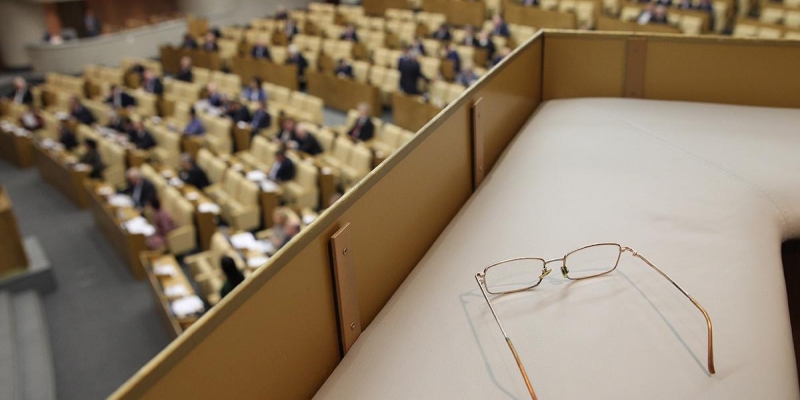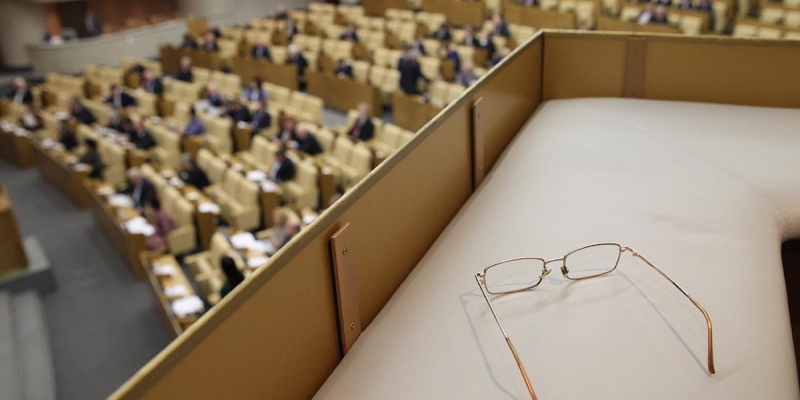TschThe relevant Duma committees have approved amendments to the bill banning LGBG propaganda, expanding the scope of their action. The Duma also heard the first explanations of the authorities regarding images of gay parades and homosexual couples

The draft law on combating LGBT propaganda will be amended in the second reading, expanding the scope of the proposed bans. The list of amendments was adopted on November 21 at an expanded meeting of the relevant State Duma Committee on Information Policy.
In particular, one of them amends Article 7 of the Law “On Consumer Protection”, which enshrines the consumer’s right to ensure that a product or service in its normal use is safe for life and health. Paragraph 4 of the article establishes a ban on the sale of goods without confirmation of their safety. It will be supplemented with a clause banning the sale of goods, including imported ones, “containing information for the dissemination of which administrative or criminal liability is provided,” that is, including LGBT propaganda.
As the head of the information policy Committee Alexander Khinshtein stressed, books will also fall under the ban on the sale of goods with prohibited information. He also noted that this legislative activity is in no way aimed at censorship, but aims to protect traditional values, as well as children from the destructive and negative influence of content.
A package of bills banning LGBT propaganda was submitted to the Duma in October, its co-authors were almost 400 deputies. He amends a number of federal laws and the Code of Administrative Offenses (in terms of determining the punishment for them).
According to the current legislation, propaganda of non-traditional sexual relations is prohibited only among children. If the law is passed, the ban will extend to an adult audience. In addition, the propaganda of pedophilia, the dissemination of information justifying it or forming an attractive image, the dissemination of information among children that can cause a desire to change gender will be prohibited. It is proposed to restrict access to prohibited content for children on paid services using special codes.
The bills passed the first reading on October 26.
How the law will be clarified
In total, the Information Policy Committee received 31 amendments. 11 of them were accepted, 20 were rejected. All the adopted amendments were made by Khinstein.
The approved amendments expand a number of legislative norms regarding the prohibition of propaganda of pedophilia and sex change. It is supposed to oblige the owners of social networks to identify information promoting non-traditional sexual relations and (or) preferences, pedophilia, sex change (now this rule applies to child pornography, information about drug production methods, suicide methods, calls for mass riots, etc.).
Read on RBC Pro Why Xi Jinping’s new term scared Chinese startups and their investors Why teeth react to cold and how to help yourself Borscht — chief adviser: how Arkady Novikov does business Why is it so difficult to wake up in the fall and how to help yourself
The list of grounds for which sites will be entered into the unified register of Internet resources containing prohibited information is also expanding. After being entered into the registry, the owners of the pages will have to delete the information, otherwise the resource will be blocked. In addition, one of the amendments prohibits propaganda of pedophilia and gender reassignment in the media (in the text of the bill approved in the first reading, only propaganda of non-traditional sexual relations and (or) preferences was mentioned).
During the meeting of the committee, a discussion broke out about whether, for example, a TV report on a gay pride parade would be punishable. Deputy Head of Roskomnadzor Vadim Subbotin explained that it would depend on the context of the commentary to the image, the audio component of the plot. Khinshtein added that the gay parade will not fall under LGBT propaganda if its demonstration does not cause positive emotions in the audience and will be accompanied by appropriate explanations.
A similar question arose about the recent news about the marriage of journalist Mikhail Zygar with actor Jean-Michel Shcherbak, in particular about the picture with their kiss. Subbotin explained that showing a retouched photo after the adoption of the law, most likely, will not be considered propaganda of non-traditional relations, but it may well be regarded as a demonstration of them.
Given that the bill prohibits, among other things, the demonstration of LGBT relationships to children, such a photo will not be shown on television from 4:00 to 23:00 (at this time, TV channels are prohibited from showing content labeled 18+). Violation may result in a fine.
In addition, it is proposed to introduce a norm into the law “On the Basic Guarantees of the Rights of the Child in the Russian Federation”, which will oblige the authorities to take measures to protect children not only from information promoting non-traditional sexual relations (in the current version of the law), but also to demonstrate such relations, pedophilia propaganda and information, &capable of making children want to change their gender.
Which amendments were rejected
Among the rejected amendments is the proposal of Deputy Yana Lantratova (“Fair Russia” For the Truth”) to introduce into the law a ban on the demonstration in computer games of materials promoting violence, cruelty, non-traditional sexual relations, as well as information that can cause children to want to change their gender. In addition, Lantratova proposed to ban pornography in games, information about ways to commit suicide and about the production of drugs.
Commenting on this proposal, Khinstein said that such an extensive category should be regulated by a separate bill, in which, first of all, it is necessary to formulate a definition of computer and video games to which it is proposed to apply the ban.
Igor Ashmanov, an expert in the field of information technology and artificial intelligence, a member of the Human Rights Council, spoke in favor of introducing separate amendments regulating the dissemination of LGBT propaganda and violence in video games during the meeting of the committee. According to him, the gaming industry in Russia is now “represented only by VK” and “there is no business in it”. In addition, he mentioned the ban on Russian esports teams to participate in most major international tournaments. “The Western industry collapsed here, they left the country themselves, and we don’t need to protect them,” Ashmanov explained.
As a positive experience in regulating video games, Ashmanov cited the regulatory practice of China, where, for example, the image of “red blood” in games is prohibited, and participation in multiplayer games of schoolchildren is allowed only until 22:00.
The amendments proposed by Deputy Ksenia Goryacheva (“New People”) and establishing general requirements for the examination, which determines whether the content contains propaganda of non-traditional sexual relations or not, were also not adopted.
In addition, the committee rejected the proposals of Deputy Nina Ostanina (KPRF) to include in the list of prohibited information that denies traditional family values and promotes voluntary refusal to have children, as well as the ideology of childlessness.
How will the Administrative Code change
The State Duma Committee on State Construction and Legislation on the same day considered amendments to the bill, which amends the Administrative Code and establishes liability for violation of the ban. Currently, punishment is provided only for propaganda of non-traditional relationships among minors (current Article 6.21 of the Administrative Code).
By the second reading, the list of prohibited information, for the propaganda of which can be prosecuted under 6.21 of the Administrative Code, has expanded. It will now include the promotion of gender reassignment or the imposition of information about it, follows from the approved table of amendments. The proposal was made by Alexander Khinshtein. In total, 22 amendments were made to the bill, six were approved, most of which are of a technical nature.
Among the rejected proposals was an amendment by Nina Ostanina and Nikolai Burlyaev (“Fair Russia for the Truth”) on criminal liability for LGBT propaganda. In addition, the committee disagreed with the opinion of Yana Lantratova about the need to separately describe the punishment for propaganda in computer games in the code, as well as with Ksenia Goryacheva, who proposed not to extend the new norms of the Administrative Code to works of art and postpone the entry into force of the law until July 1, 2023.
What industry experts said
Roskomnadzor supports the proposed initiatives of deputies, Subbotin said, specifying that the agency is ready to implement the new standards in full. According to him, Roskomnadzor has deleted or blocked information promoting LGBT among minors from more than 5.5 thousand sites. However, previously such materials were blocked on the basis of court decisions, which delayed the process.
Subbotin also gave a definition of what exactly will be meant by propaganda: “The use of certain means of influence, popularization, imposing information in order to form certain positive distorted views on a destructive phenomenon. A kind of rigidly imposed position on certain value and spiritual and moral issues.
According to the Deputy Minister of Culture Nadezhda Reverend, the amendments will become a “legal basis” for making decisions not only on the production of film products, but also on the organization of theatrical productions, exhibitions and concerts. “When there is a legal norm, we will have a legal basis to reject once and for all (events containing LGBT propaganda.—RBC)»,— she clarified.
Elena Starostina, Executive Director of the Russian Book Union, noting that the union as a whole supports the adoption of amendments, asked legislators to clarify what book publishers should do with products that have already been published, sold and are in libraries in compliance with the norms of the law on age labeling. She also drew attention to the “non-specific wording” of the bill. Earlier, Oleg Novikov, president of one of the largest publishing groups in Russia, Eksmo-AST, also spoke about this.
Denis Tokarsky, a member of the Union of Journalists of Russia, conceptually supported the amendments and expressed concerns about a potentially possible deterioration of the position of the press: “I don’t want our colleagues to ignore some information reasons, fearing that it could be perceived as propaganda of something unconventional. In this regard, we hope to cooperate with Roskomnadzor. Tokarsky also clarified that the discussion about LGBT values is not in the first place in the Russian media.
Composer Igor Matvienko suggested that banning LGBT propaganda can only fuel public interest in banned content. “Of course, it needs to be introduced, of course,” the musician said at the meeting.— As— here I have more questions». Matvienko recalled that in the 1970s in the USSR “English-language music was actually banned”, but this, in his opinion, “fueled even greater interest” in it. «Any forbidden — it’s very interesting, I know by myself»,— he added.
Authors Tags What rates on deposits in yuan are offered by banks
We understand the mailing list

